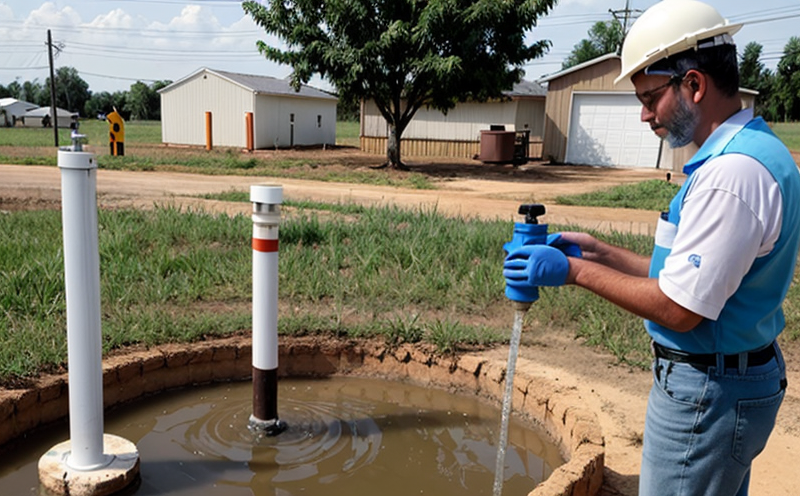ASTM D6565 Pesticide Residues in Groundwater Testing
The ASTM D6565 standard provides a comprehensive approach to the analysis of pesticide residues in groundwater. This method is crucial for ensuring that drinking water supplies are safe and meet regulatory standards set by environmental authorities worldwide.
Groundwater serves as a vital resource, providing clean drinking water for millions of people. Pesticides used in agriculture can contaminate this precious resource if not managed properly. The contamination can lead to serious health risks for consumers. ASTM D6565 is designed specifically to detect these pesticides and their breakdown products, ensuring that groundwater remains safe.
The test method covers a wide range of pesticide classes including organophosphates, carbamates, pyrethroids, and fungicides among others. The process involves several steps: sample collection, extraction, clean-up, concentration, and finally analysis using liquid chromatography with tandem mass spectrometry (LC-MS/MS).
For accurate results, it is essential to follow the ASTM D6565 protocol meticulously. This includes proper field sampling techniques to avoid contamination, efficient extraction methods that ensure all residues are captured, and stringent clean-up procedures to remove interferences.
The acceptance criteria for this test are based on the limits of quantitation specified in the standard. Compliance with these criteria ensures reliable detection of even trace amounts of pesticides which could pose health risks at higher concentrations.
Our laboratory adheres strictly to ASTM D6565 guidelines when conducting pesticide residue tests. We employ highly skilled analysts equipped with state-of-the-art instrumentation, including LC-MS/MS systems capable of detecting extremely low levels of pesticides. Our facilities are accredited by internationally recognized bodies ensuring the highest level of accuracy and precision.
By using ASTM D6565 for groundwater quality testing, we contribute significantly to public health protection efforts by identifying potential threats early on. This proactive approach helps prevent contamination from spreading further into other water sources or ecosystems.
In summary, implementing ASTM D6565 in your routine laboratory procedures enhances the reliability and validity of your pesticide residue detection results. It also supports regulatory compliance requirements while safeguarding public health interests.
Why It Matters
Water quality testing, particularly for pesticides in groundwater, is critical because it directly affects human health and environmental sustainability. Pesticides used in agricultural practices can easily leach into groundwater through soil pores or surface runoff during rainy seasons.
- Pesticide contamination of groundwater poses significant risks to both humans and wildlife.
- Long-term exposure to certain pesticides may lead to various adverse effects such as reproductive issues, developmental disorders, and cancer.
- Groundwater serves not only as a drinking water source but also supports ecosystems that depend on it for survival.
The importance of accurate pesticide residue testing cannot be overstated. By ensuring compliance with established standards like ASTM D6565, we help protect public health and the environment from harmful contaminants.
Quality and Reliability Assurance
To maintain high-quality results in our pesticide residue testing, we implement rigorous quality control measures throughout every step of the process. From initial sample collection to final analysis, each phase is meticulously documented and reviewed.
We use only certified reagents and solvents to minimize contamination risks during extraction processes. Our laboratory technicians undergo continuous training to stay updated on the latest methodologies and best practices recommended by industry leaders such as ASTM.
Our facility maintains strict adherence to ISO/IEC 17025 standards which ensure that all testing activities meet international quality requirements. Regular audits conducted by independent third parties further reinforce our commitment to excellence in laboratory operations.
The accuracy and precision of our results are guaranteed through extensive inter-laboratory comparisons with other accredited laboratories around the globe. These collaborations allow us to benchmark performance against global best practices continually improving our capabilities.
Environmental and Sustainability Contributions
The analysis of pesticide residues in groundwater plays a crucial role in environmental sustainability initiatives. By identifying contaminated areas early, we enable targeted remediation efforts to restore affected sites back into productive use.
- Reduction in Contamination Spread: Early detection allows for containment measures preventing further spread of contamination.
- Ecosystem Preservation: Protecting water bodies from pesticide pollution helps preserve local biodiversity.
- Sustainable Agriculture Practices: Identifying problematic pesticides promotes the adoption of safer alternatives supporting long-term agricultural sustainability.
Our commitment to environmental stewardship extends beyond individual projects; we actively contribute to broader community initiatives aimed at promoting clean water resources and sustainable development goals.





